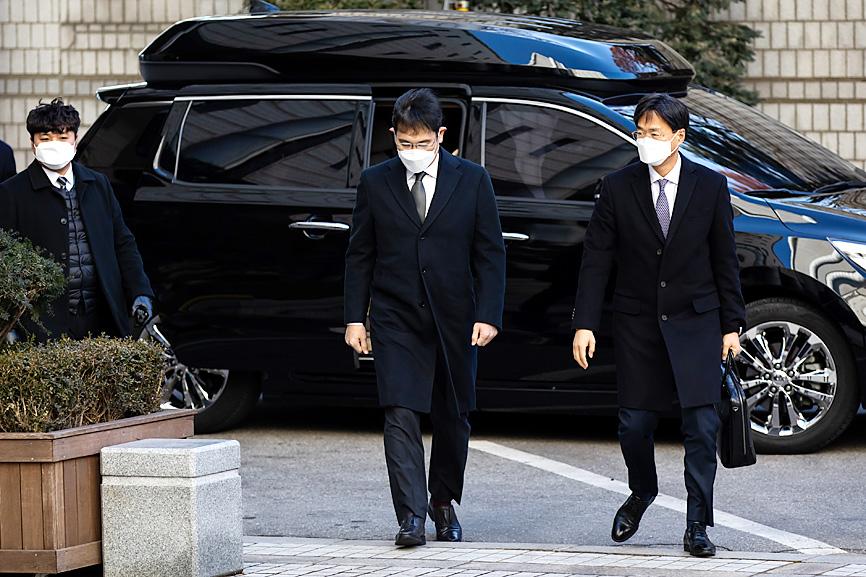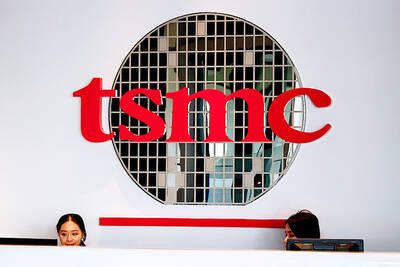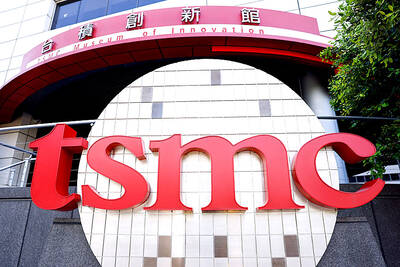South Korean prosecutors yesterday requested a nine-year prison term for Samsung Group chairman Jay Y. Lee, seeking to put the heir apparent back in jail in a bribery case that rocked the nation and ignited a backlash against its most powerful conglomerates.
Special prosecutors proposed the sentence during a hearing at the Seoul High Court, which is to make its ruling in the next few months.
“There’s no denying that it has made a lot of positive impact on our society, but just because there’s been an economic contribution, there should be no hesitation in legal enforcement based on the rule of law,” a transcript of closing arguments from prosecutors said, referring to Samsung.

Photo: Bloomberg
The 52-year-old billionaire is fighting allegations of graft in a retrial of a case that started four years ago, and led to his imprisonment and the ouster of former South Korean president Park Geun-hye.
The outcome of the case could snarl succession at Samsung Electronics Co, just as Lee is expected to formally take the helm of the mobile and electronics giant after the death of his father in October.
The executive stands accused of making gifts to cement his control over the world’s largest smartphone maker and smooth his ascension.
Lee served a year in jail before his release in 2018 after an initial five-year prison term was halved and suspended by an appeals court.
However, in August, the Supreme Court voided that decision, thrusting the executive back before a judge.
Lee faced a tougher sentence this time — a minimum of five years — because the amount of alleged bribery acknowledged by the top court increased.
Yet experts viewed a decreasing chance of imprisonment as the trial drew to a close.
Judges at the high court asked Samsung and Lee to impose measures to prevent illegal activity, and improve credibility among the group.
Lee responded by setting up an independent compliance committee and issuing a personal apology in May over past wrongdoings related to the succession process.
He also pledged publicly not to hand down leadership of South Korea’s largest conglomerate to his children.
The compliance committee’s activities are to be factored into Lee’s eventual sentencing.
The bribery allegations stem from a merger in 2015 between two Samsung units that helped Lee gain control over the group.
Prosecutors argued that Samsung offered horses and financial contributions, via an intermediary, to a confidante of Park to try and win the government’s support for the deal.
Lee, who stepped down from an internal director post, remains Samsung Electronics’ vice chairman and de facto leader.
Although his father and company chairman, Lee Kun-hee, died in October, the Samsung scion has not been immediately crowned his successor.
Samsung Electronics is likely to hold off on naming him to that role at least until the trial is completed.
Separately, Jay Lee is embroiled in another trial related to the 2015 merger, with allegations ranging from contraventions of capital market laws to breach of duty.
Prosecutors in September indicted Jay Lee and hearings are set to resume on Jan. 14.

Chizuko Kimura has become the first female sushi chef in the world to win a Michelin star, fulfilling a promise she made to her dying husband to continue his legacy. The 54-year-old Japanese chef regained the Michelin star her late husband, Shunei Kimura, won three years ago for their Sushi Shunei restaurant in Paris. For Shunei Kimura, the star was a dream come true. However, the joy was short-lived. He died from cancer just three months later in June 2022. He was 65. The following year, the restaurant in the heart of Montmartre lost its star rating. Chizuko Kimura insisted that the new star is still down

While China’s leaders use their economic and political might to fight US President Donald Trump’s trade war “to the end,” its army of social media soldiers are embarking on a more humorous campaign online. Trump’s tariff blitz has seen Washington and Beijing impose eye-watering duties on imports from the other, fanning a standoff between the economic superpowers that has sparked global recession fears and sent markets into a tailspin. Trump says his policy is a response to years of being “ripped off” by other countries and aims to bring manufacturing to the US, forcing companies to employ US workers. However, China’s online warriors

Taiwan Semiconductor Manufacturing Co (TSMC, 台積電) listed the challenges of ensuring export control compliance by its customers, months after the company’s artificial intelligence (AI) silicon was found to have flowed to US-sanctioned Huawei Technologies Co (華為) via intermediaries. “TSMC’s role in the semiconductor supply chain inherently limits its visibility and information available to it regarding the downstream use or user of final products that incorporate semiconductors manufactured by it,” the Hsinchu-based company said in its latest annual report released on Friday. The world’s largest contract chipmaker said the constraint impedes its ability to prevent unintended end-uses of its semiconductors, as well

Taiwan Semiconductor Manufacturing Co (TSMC, 台積電) expects steady growth this year despite global economic uncertainty due to continued momentum from tech trends such as 5G, artificial intelligence (AI) and high-performance computing (HPC) applications. In the company’s annual shareholders’ report released on Thursday, TSMC chairman and CEO C.C. Wei (魏哲家) said the company is well-positioned to meet market demand with its differentiated technology platforms. The company’s 2-nanometer process is on track for volume production in the second half of this year, while its next-generation nanosheet-based A16 process, aimed at HPC applications, is scheduled for mass production late next year, Wei said. Advanced technologies —